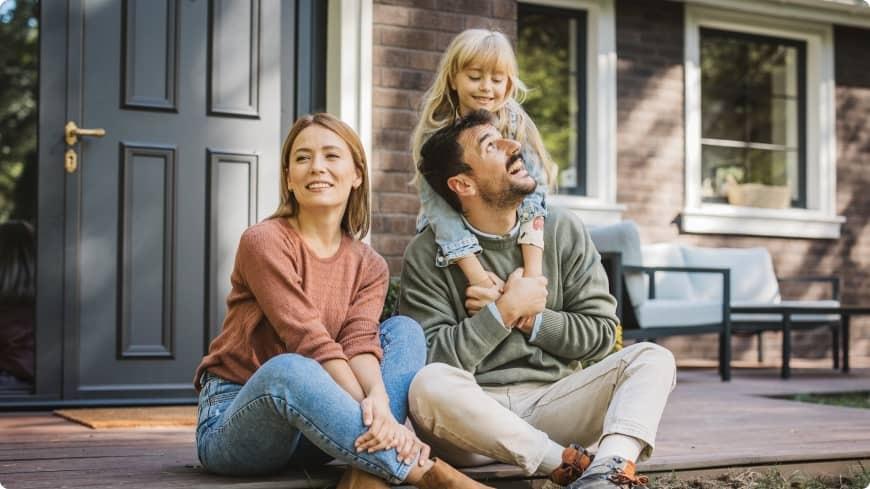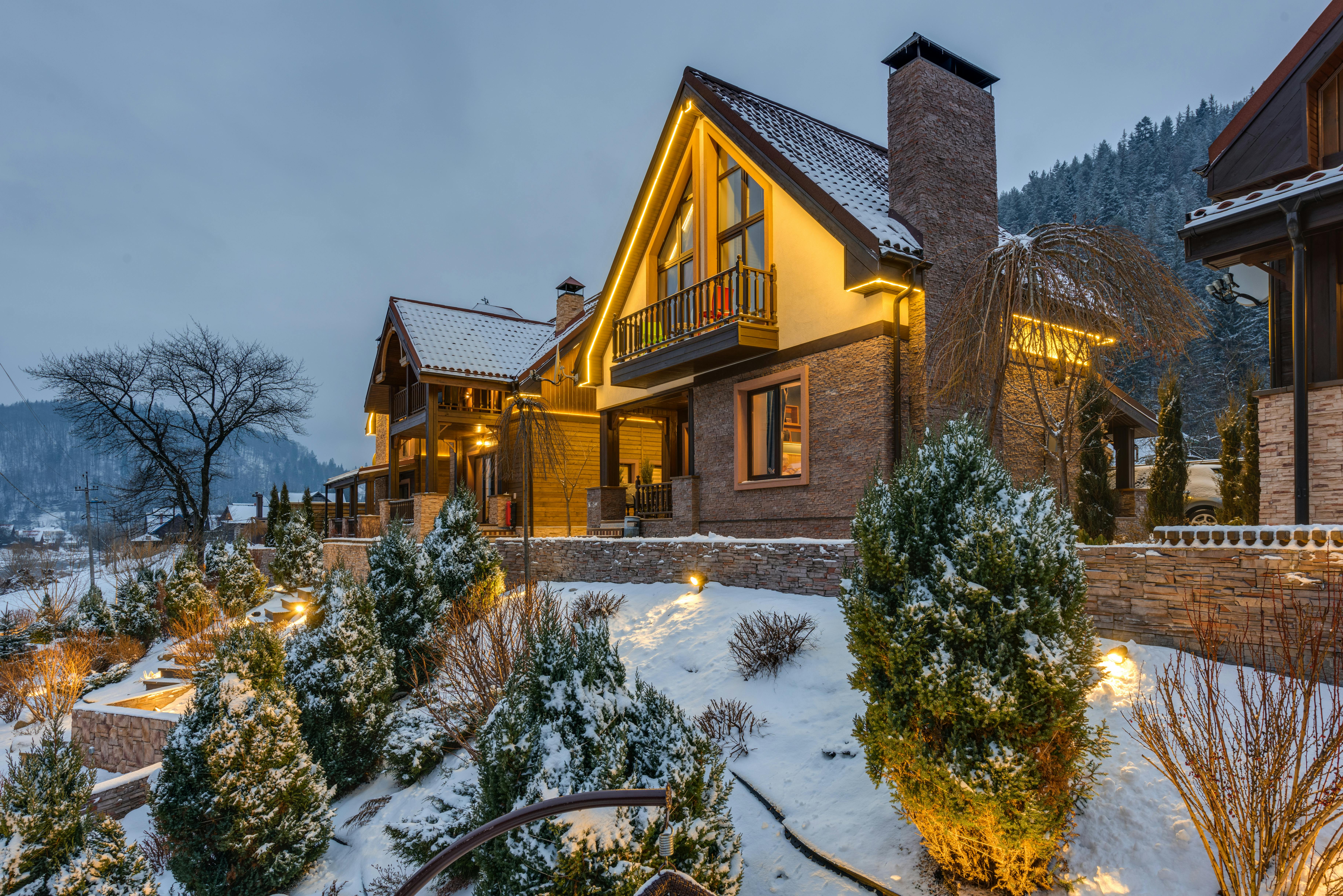Starter Home vs. Forever Home: Pros & Cons

In today's housing market, a growing number of first-time homeowners are opting to skip over the traditional ‘starter’ home and purchasing their 'forever' home first. This is the home that they plan to live in for the rest of their life. While this strategy of finding a home that will suit all of their future needs won't work for every first-time homebuyer, a 'one-and-done' approach is definitely worth considering.
In this discussion, we'll take a look at the top pros and cons of both a hypothetical starter home and a forever home. If you are a first-time homebuyer, we hope this will help you make a more informed decision about what kind of home you should pursue.
A quick note on terminology before we get started: We'll be using the terms 'starter home' and 'forever home' quite a bit here. We define a starter home as being a standard living space that likely doesn't have all the room and amenities of your dream home but is also more affordable. On the other hand, a forever home has everything you need to raise a family as well as act as your retirement home. With that in mind, let's get started.
Starter Homes
Prices
For many, the price of the home, and how much you might need for a down payment, is one of the biggest factors in determining the feasibility of a particular house on the market. It's easy to fall in love with a home that's out of your price range (another good reason to get pre-approved early in the process), but there can be more factors in play than simply the sticker price.
- Pro: The lower the price, the lower your monthly mortgage payment tends to be. Since down payments are a function of the price of the home, the amount of resources you need at hand to afford a home will likewise be lower if you can find a great deal. Less dollars going to a monthly payment means more in your pocketbook to address other expenses.
- Con: The full price of a starter home can sometimes be irrelevant since you are, by definition, not planning on staying there indefinitely. Besides that, you often get what you pay for. A starter home may really feel like a starter home due to its lack of space and amenities that a forever home might include.
Build equity earlier
Buying a home is one of the most proven and time-tested ways of building equity. It can also be one of the ways to build generational wealth. We all have to pay for the space to hang our hat, but equity allows you to eventually own that space. Renting, by contrast, is a zero-sum game, where you will never be able to own the space, and you have no control over how much you will pay to stay there.
- Pro: Building equity is a long game. It can take years to accumulate enough equity for you to borrow against with a home equity loan, HELOC, cash-out refi or similar method. So, getting started early can have lasting advantages over your lifetime. A starter home allows you to get the ball rolling, which can be greatly beneficial.
- Con: There really isn't a downside to building equity, which makes this entry on our list one of the most compelling reasons to get your proverbial foot in the door as early as you can. As we discussed above, a starter home's overall lower price may allow you to build equity sooner rather than later, which is always a good thing.
Maintenance costs
Any homeowner can tell you that maintenance on a home can be challenging to say the least. These costs have to be factored into your overall thinking when buying a home, because when something breaks, you'll be responsible for repairing it. On the surface, it might seem like a starter home might have fewer maintenance costs, but there are a few other factors that need consideration.
- Pro: Likely, your starter home will be smaller and less complex than your forever home. A smaller space and fewer amenities will probably require less upkeep to maintain. Replacing the roof on a 2,000 square-foot house, for instance, is almost certainly going to be less overall than a home that measures 5,000 square feet.
- Con: The age of your starter home can play a role in what the maintenance on your home will look like. A small home that was built in the 1970s might have a lower price, but you might be looking at major repairs just to keep it in good order. A newer home might wind up with less maintenance required since its systems are built to a modern standard with less time on them to wear out.
Availability
With so many markets struggling with housing inventory, the availability of homes is one of the key factors in becoming a homeowner. After all, you can't buy a house if there aren't any houses to buy. It stands to reason that, depending on the market conditions in your area, finding a home that will meet your immediate needs will probably be easier to find than a dream home that checks all the boxes on your list. This can play a major part in deciding whether to go ahead and buy or hold out for something else later on.
- Pro: A real, tangible home that's within reach is generally preferable over the dreams of a home that may never materialize. If you're already feeling the sting of not having your own space and/or your family needs a roof over their head immediately, a starter home may be just the solution you've been looking for.
- Con: If you have a clear idea of what you want your dream home to be, settling for whatever you can find might force you to make concessions or redefine some of your 'must-haves' to match the available properties. In this case, perhaps a new home construction might make more sense since it side-steps the issue of inventory and allows you to directly influence the new home to align with your vision.
Forever Homes
Family concerns
Whether you are planning to start a new family or you need to take care of previous generations, the needs of your family will drive many of your decisions about the home you can live with. As we established, starter homes will, on average, have less space than a forever home, so this is something that you'll need to weigh when finding the balance for you and your family.
- Pro: A forever home, with more room, and spaces designed with each family member in mind, will naturally suit the needs of your family quite a bit better than your average starter home. When it comes to having enough space at the dinner table, or just places where you can relax and enjoy some privacy, it's easier to achieve this with more space than it is with less.
- Con: If you're just starting out with no immediate plans to house anyone other than your existing immediate family, a forever home might not be as preferable in this case. The good thing about starter homes is that they can be a nice steppingstone to something new if and when the time comes that you need the extra space and familial accommodations.
Location
There's always more to deciding upon a home than just the home itself. You'll want to know the county or parish, so you can get an idea of the local taxes. Then you'll want to know the schools, the ease of access to public transportation or major infrastructure (or lack thereof). How far is the closest grocery store, movie theater or row of restaurants? These are all things to consider about the location your home will inhabit.
- Pro: If you are intent on putting down roots, the home's location is a much bigger decision than it would be for a starter home — especially if you have kids. Really it comes down to this: the longer you plan on living in the home, the more important the location of that home becomes.
- Con: While the physical location of your home will never not be an important factor, it might be less important to you if you know the situation is temporary before you move in. Even if the location of your starter home has its inconveniences, you may be able to tolerate them if the house's other attributes make up for it.
Amenities
Just as forever homes are more likely to have a bigger floor plan, they are also more likely to have some built-in amenities that can make the quality of life better for you. It could be a pool, space for a gym or home office. Amenities are that 'something extra' that can really transform a home from a simple place of residence to a place for living.
- Pro: There are too many pros to list here, and it can be next to impossible to quantify what something like a pool or dedicated home office space can add to your standard of living. If you are a foodie, a fully modernized kitchen with all the bells and whistles might be just what you are craving. By the same token, if you are a cinephile, having a well-appointed home theater system might be everything to you.
- Con: This con is simply the counterpoint to the maintenance point above. The more expensive and complex amenities could add to your maintenance costs over and above the regular costs of owning your home. It's worth doing some research ahead of time when you run your budget to know what additional costs an amenity-rich home might have. This information is good to know regardless of whether you are going the starter or forever route.
Anticipating future needs
Perhaps the most important indicator of whether you need to buy a starter home or a forever home is simply how well the home in question will meet your needs, both now and in the future. Life throws all manner of surprises at us, so understanding where you'll be in ten, twenty, or thirty years in the future (and what your needs at that time will be) is no easy feat.
- Pro: If you know that you are going to start a family or need to care for your older relatives in the near future, or any other concerns that may come into play, you might need to look more at something that goes beyond a starter home, just to save yourself the inevitable hassle of moving again to a more suitable space when the time comes.
- Con: If the future for you is wide open, and there are no major concerns anywhere on the horizon that will affect your housing needs, perhaps you need to start with something smaller and more manageable. That way, you can get used to being a homeowner first before graduating to a space that will meet the needs of your future self.
Final thoughts
As you can see, there are definite advantages to both approaches. Starter homes are more likely to be cheaper and allow you to start building equity sooner, but you may outgrow them in a variety of ways, given time; a forever home will probably be much more in terms of your monthly payment, but you’ll have a space with more of what you want and a lasting place to build a life for yourself.
So, if you are in the market for your first home, or you are someone who is just starting to contemplate their path to owning a home, we hope that this list has given you some important food for thought. It takes some planning, some creativity, and a healthy dose of self-discovery, but if you can explore what you need and want from a home purchase ahead of time, you can know whether your path forward is to buy your first home or your only home.
Applicant subject to credit and underwriting approval. Not all applicants will be approved for financing. Receipt of application does not represent an approval for financing or interest rate guarantee. Restrictions may apply.




